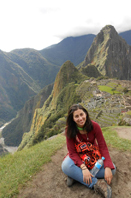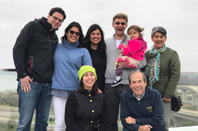Interview with Natalia Loaiza
A Conversation with Natalia Loaiza, Administrative Analyst
Where were you born and raised? Tell me about your family here and those who still live "back home."
 I was born in Springfield, Massachusetts. Fun fact: that is where Dr. Seuss is from and where basketball was invented. When I was 11 years old, our family moved to Charlotte, North Carolina area, where I spent my formative years and which I call 'home'. My parents and two elder twin sisters are from Colombia and I am a first-generation American. My paternal grandmother and some relatives occasionally come to visit but the rest of the family is still in Colombia. Grandma is 86 and lives alone in Bogota; my favorite memory is learning she spontaneously joined a protest march and, when asked what it was about, she had no clue but was determined to go again the next day.
I was born in Springfield, Massachusetts. Fun fact: that is where Dr. Seuss is from and where basketball was invented. When I was 11 years old, our family moved to Charlotte, North Carolina area, where I spent my formative years and which I call 'home'. My parents and two elder twin sisters are from Colombia and I am a first-generation American. My paternal grandmother and some relatives occasionally come to visit but the rest of the family is still in Colombia. Grandma is 86 and lives alone in Bogota; my favorite memory is learning she spontaneously joined a protest march and, when asked what it was about, she had no clue but was determined to go again the next day.
Describe your transition from North Carolina to California.
It was very quick. I learned I got the job at UCSF the first week of June and started at the end of June. In between, I had a wedding in Philly so I had exactly one week to prep, pack, and move—I didn't have time to think or process emotions. What I miss is sweet tea, a staple in North Carolina, which is iced black tea with lots of sugar boiled in with the tea. I also miss the open friendliness of people in North Carolina, where people will wave from across the street and yell, "how are you?" even if they don't know you.
What old favorites or new titles are on your To Read list? Which literary character do you most identify with, and why?
I have a running list of books I want to read. One is Trevor Noah’s Born a Crime and another is Paul Beatty’s The Sellout which has similarities to The Invisible Man, from the 1950s, a story about a black man in the US who is invisible in society. Another old favorite I recently reread is A Hitchhiker's Guide to the Galaxy and is great fun because you get the inside jokes that you missed as a kid. One of my favorite literary characters is Elizabeth Bennet, from Pride and Prejudice. She is not imprudent nor is she weak, which I think is an extremism that many authors go to when describing female protagonists. Elizabeth does not allow herself to be forced into the cages of societal expectations, but she still enjoys participating in popular social events. This character is a great reminder to truly figure out what brings us joy and to embrace it.
Who might you wish to interview? Why and what would you particularly want to learn about them or their era?
Neil deGrasse Tyson. I grew up watching him on NOVA and he made astrophysics cool. Space has always interested me, and for the longest time, I wanted to be an aeronautical engineer and even went to engineering camp. I realized that it wasn't for me because I wanted to remain hands-on and fully involved, not just design and then relinquish the project. My biggest question for him would be: How is he able to make something as technical as astrophysics interesting? People don't necessarily read about space, but he makes it fascinating. He has a way of allowing one to retain information and feel encouraged to share it.
Where have you traveled? Recall an anecdote about something that happened in another country and why it remains a favorite memory.
I've been to Colombia, Peru, Australia, Canada, and Thailand, and I want to go to South A frica or Europe soon. During college, I traveled with a student organization to Peru, near Lake Titicaca, a place with a much higher elevation than Machu Picchu. We'd been there for about a week when altitude sickness hit me really badly. I was miserable and on locally obtained over-the-counter antibiotics on my 21st birthday when we were traveling from Puno to Cuzco, headed for Machu Picchu, on local buses—a long, smelly, and bumpy drive. In Cuzco, a hair braider told us about a local place where we could hear salsa, but none of my friends wanted to go. Two finally came with me and it turned out to be a great birthday, with a small band playing classic salsa and we danced in our hiking boots and dirty jeans. I completely forgot I was sick and had a great birthday.
frica or Europe soon. During college, I traveled with a student organization to Peru, near Lake Titicaca, a place with a much higher elevation than Machu Picchu. We'd been there for about a week when altitude sickness hit me really badly. I was miserable and on locally obtained over-the-counter antibiotics on my 21st birthday when we were traveling from Puno to Cuzco, headed for Machu Picchu, on local buses—a long, smelly, and bumpy drive. In Cuzco, a hair braider told us about a local place where we could hear salsa, but none of my friends wanted to go. Two finally came with me and it turned out to be a great birthday, with a small band playing classic salsa and we danced in our hiking boots and dirty jeans. I completely forgot I was sick and had a great birthday.
What would you absolutely need on that proverbial desert island?
A dog. Maybe a human, but definitely a dog.
Describe an event that you've attended that was unusual, quirky, or great fun?
I recently attended a pun-off. The competitors are given a topic and spontaneously use puns in a story within the given theme. It involves listening intently because sometimes the topics are things you know nothing about and you might not get the puns the first time around. These people come up with amazing puns on the spot! It has a homegrown, community feel and the winners receive a homemade trophy.
To what achievement do you aspire?
I studied International Development with a focus on economics, and that idea is still alive in the back of my head. I want to learn and grow and, maybe someday, find an application in which I could find ways to work on a macro level to help make countries equal in individual ways. Maybe in an idealistic Star Trekkian way, I believe in the concept of each continent, each country, having economic equality but not by being pushed into conformity with Western ideologies. I would like to, including through my work here, learn about working in an economic environment that could impact policy. I do realize that people can get where they envision in many ways or sometimes somewhere that they didn't, and sometimes that's even better.
What foods best represent home and family?
 When my family gets together, holidays or not, we get rice and beans no matter what. And arepas, made with cornmeal and cheese. It is controversial about how they should be eaten. Venezuelans stuff their arepas like sandwiches with eggs or meat, but ours are enjoyed with the toppings on top. They are so good!
When my family gets together, holidays or not, we get rice and beans no matter what. And arepas, made with cornmeal and cheese. It is controversial about how they should be eaten. Venezuelans stuff their arepas like sandwiches with eggs or meat, but ours are enjoyed with the toppings on top. They are so good!
Thank you, Natalia!
- by Oralia Schatzman
View Natalia's professional bio | See previous faculty interviews
